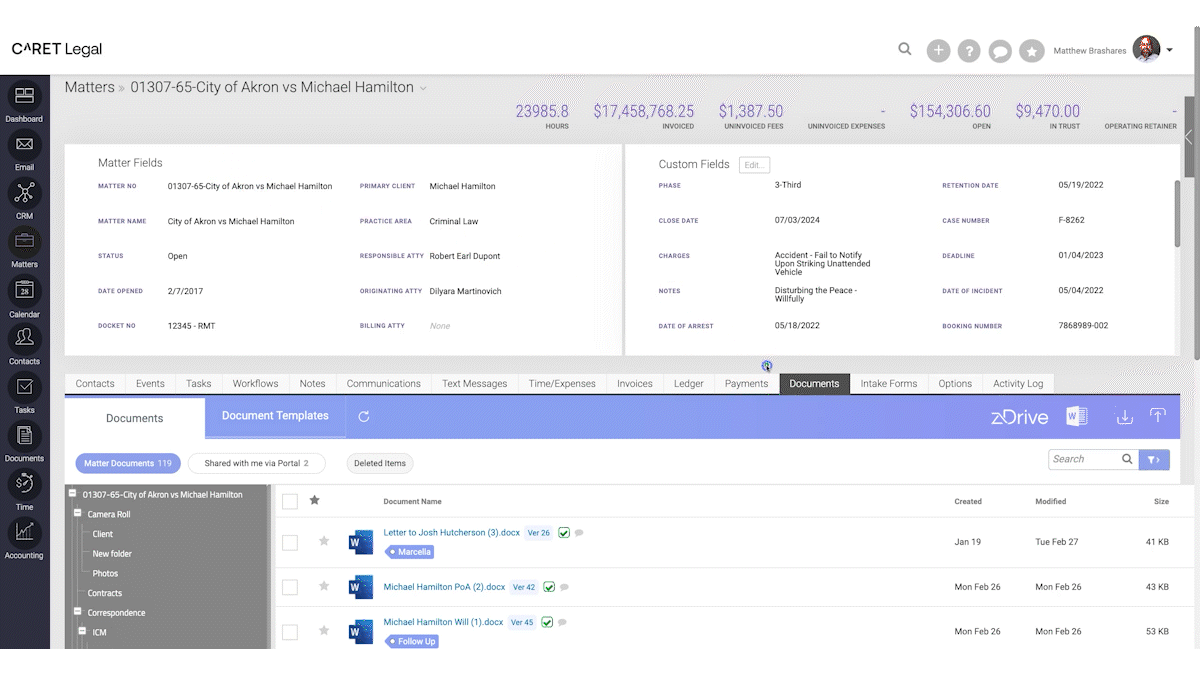The big takeaways:
- Litigation requires software designed to manage complex workflows, strict deadlines, and discovery
- Purpose-built tools improve document review, docketing accuracy, and team coordination
- CARET Legal gives litigation teams the structure they need to reduce risk and work more efficiently
While general legal practice tools can be helpful for law firms handling a broad range of matters, they rarely address the unique challenges of litigation. Case complexity, discovery management, and rigid court deadlines require specialized litigation case management software that is purpose-built for these environments. Without it, litigation teams often face inefficiencies that directly impact client outcomes.
Litigation Workflows Are More Demanding
Litigation cases generate layers of activity that must be tracked with accuracy. From discovery requests and depositions to hearings and trial preparation, each stage adds tasks, documents, and deadlines. General practice tools may provide basic calendars and task lists, but they are not equipped to handle intricate litigation docketing requirements or multi-phase case progression.
Litigators also rely on matter-specific workflows that evolve as cases progress. A transactional case may follow predictable steps, but litigation requires flexibility within a structured system. Missing one deadline or losing track of a single motion can have serious consequences. Efficient litigation management software can address these complexities by integrating advanced docketing, workflow tracking, and document management designed for high-stakes litigation environments.
Document Management and Discovery Challenges
Litigation firms often manage large volumes of records. Discovery alone can involve thousands of documents, emails, and transcripts that need to be reviewed, categorized, and stored securely. General practice legal software typically offers document storage, but not the advanced review capabilities litigation teams need.
Litigation case management software provides stronger tools for organizing, tagging, and retrieving documents quickly. Discovery management features allow attorneys and staff to search across large datasets, track document versions, and prepare productions efficiently. Centralized storage helps the litigation team work from the most current version, reducing risks associated with duplication or misfiling. By providing the ability to organize massive document sets, litigation-focused systems directly support efficiency and accuracy in discovery.

Why Precision in Docketing Protects Every Case
Court deadlines define the pace of litigation. Unlike transactional practices, where timelines are often client-driven, litigation requires strict adherence to rules and court schedules. General practice tools may offer a calendar, but they typically lack the ability to calculate deadlines based on jurisdiction-specific rules or link documents directly to docket entries.
Dedicated litigation docketing ensures critical dates are never overlooked. Automated calendaring tools generate events based on court rules. This integration reduces the risk of error while allowing attorneys and staff to prepare ahead with confidence.
When docketing is handled within a specialized litigation case management system, firms protect themselves against missed deadlines that could jeopardize a case.
Collaboration Across the Litigation Team
Litigation is a team effort that depends on attorneys, paralegals, and support staff working together with tools that facilitate seamless collaboration, especially when managing large caseloads or preparing for trial.
Advanced legal case management software addresses this by enabling shared calendars, centralized task assignments, and communication tools linked to each matter. When every team member has access to the same information, redundancy decreases and accountability increases. This level of coordination is necessary for managing high-volume discovery, preparing witness examinations, or organizing trial exhibits. Better collaboration translates directly into stronger case preparation and improved outcomes for clients.
Why Litigation Firms Need Purpose-Built Tools
General practice software serves a purpose, but litigation firms require tools designed with their workflows in mind. Litigation case management systems integrate docketing, document review, discovery management, and collaboration into a single platform. CARET Legal delivers these capabilities in an intuitive system that aligns with the realities of litigation practice.
By automating administrative tasks, improving accuracy in docketing, and centralizing case information, litigation teams can focus more on strategy and advocacy. Instead of adapting general tools that leave gaps in critical processes, firms gain a solution built specifically for the pace and demands of litigation.
Start a free trial today to experience how litigation case management software can streamline workflows, strengthen collaboration, and keep every case on track.
